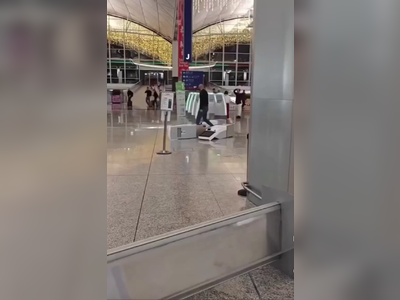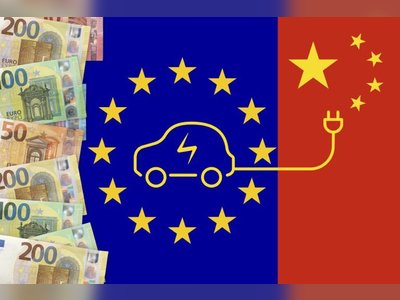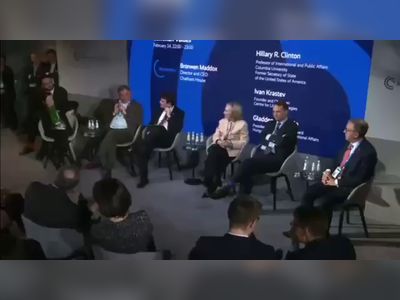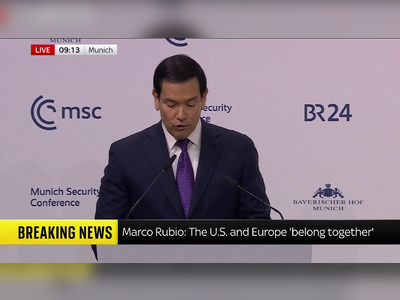
China's Xi seeks fresh diplomatic inroads with Asian leaders
Chinese President Xi Jinping has used his first face-to-face meetings with America’s Asia-Pacific allies since 2020 to try to forge diplomatic inroads as Washington pushes back against Beijing’s influence in the region.
Xi has not backed away from China’s longstanding claims to Taiwan and most of the South China Sea. But his comments to various leaders at the Asia-Pacific Economic Cooperation forum in Bangkok this week have focused more on Beijing’s pivotal economic role for its neighbors.
As China’s stature has risen, its diplomacy has grown more nuanced than the high-handed approach that has sometimes sparked resentment in the past.
“Xi Jinping’s diplomatic engagements and the supporting chorus of propaganda messages have sought to put forward a softer, smiling facade in what appears to be an effort to reduce friction and tensions, particularly with the U.S. and European countries that have become increasingly critical, frustrated and committed to competing with China,” said Drew Thompson, a visiting senior research fellow at the Lee Kuan Yew School of Public Policy at the National University of Singapore.
In his address to the annual summit of APEC, whose 21-member economies ring the Pacific, Xi said that “China is ready to pursue peaceful coexistence and common development with all countries on the basis of mutual respect, equality and mutual benefit.”
China will “continue to share our development opportunities with the world, particularly with the Asia-Pacific region,” added Xi, who has garnered a reputation as an ardent nationalist who would always put China’s interests first and never surrender “one inch” of Chinese territory.
Thompson said Xi’s reappearance on the world stage after staying in China for more than two years during the pandemic “was reassuring for many countries that have sought to establish contact with the top, perhaps the only decision-maker in China.”
The APEC forum is the third of three high-level summits in Asia where the U.S. has been pushing the message that Washington is a reliable economic and security partner, as it seeks to counter China’s growing influence.
In a speech to a business conference Friday on the sidelines of APEC, U.S. Vice President Kamala Harris assured Asian leaders “the United States is here to stay.”
“And there is no better economic partner for this region than the United States of America,” she said.
Sometimes leaders in Tokyo and Beijing can go years without meeting, reflecting longstanding grievances from Japan’s World War II invasion and occupation of China and other issues. In a meeting Thursday with Japanese Prime Minister Fumio Kishida in Bangkok, Xi stressed that the two countries should be “partners, not threats.”
Kishida told reporters after the 45-minute meeting that he had a “candid and detailed discussion” with Xi and expressed “serious concerns” over China’s activity in the East China Sea, including around the disputed Senkaku islands, and Beijing’s military activity such as launches of ballistic missiles. But he also told Xi there were various possibilities for cooperation and that it was important for Japan and China to achieve “constructive and stable” relations.
While not a U.S. ally like Japan, tiny Singapore largely embodies the region’s desire to balance its ties with Washington and Beijing. The U.S. Navy’s 7th Fleet plays an active role in the strategically key South China Sea, which China claims virtually in its entirety, and Singapore supports the American military presence.
The object appears to be to take advantage of development opportunities and close economic ties with Beijing while resisting Chinese domination.
In his meeting with Singapore Prime Minister Lee Hsien Loong, Xi pledged to work with the city-state whose population is largely ethnically Chinese to “keep to the right direction of economic and regional integration.”
In another bilateral meeting, Xi told Philippine President Ferdinand Marcos Jr., whose country is a treaty ally and important security partner of the U.S., that China is willing to boost its imports of food and other products and work together on agriculture, infrastructure, energy and people-to-people exchanges.
The Philippines, Vietnam and other countries in Southeast Asia have long had territorial disputes with China over its claims in the South China Sea.
Xi appeared to give no ground in his meeting with Marcos, saying only that “on the South China Sea, the two sides must stick to friendly consultations and handle differences and disputes properly.”
Afterward, Marcos’ office issued a short statement saying he had “expressed elation” after speaking with Xi and looked forward to a state visit to China in January.
Marcos’ office later added that the two had agreed their maritime disputes “do not define the totality of Philippines-China relations.”
President Joe Biden represented the U.S. at the Association of Southeast Asian Nations meeting in Cambodia and then the Group of 20 summit in Indonesia, with Vice President Kamala Harris representing the U.S. in Thailand.
Xi was not at the ASEAN summit, where Premier Li Keqiang represented China. At the G-20 meetings earlier this week in Bali, Indonesia, he met on the sidelines with Biden.
There was no remarkable sign of a warming of the chill between Beijing and Washington from that encounter, perhaps unsurprising given the raft of contentious issues between them.
According to the U.S., Biden reiterated Washington’s longstanding “One China” policy, which recognizes the government in Beijing while allowing for informal American relations and defense ties with Taiwan, a separately governed island democracy that China claims as its territory.
Xi stressed that “the Taiwan question is at the very core of China’s core interests, the bedrock of the political foundation of China-U.S. relations, and the first red line that must not be crossed in China-U.S. relations,” according to the Chinese government’s account of the meeting.
China staged major military drills in areas surrounding Taiwan in August in response to U.S. House Speaker Nancy Pelosi’s visit there, and fired five ballistic missiles into waters near the Japanese island of Okinawa, infuriating Japan.
While Xi might have adopted a softer approach, he is not yielding on any substantive issues, Thompson said.
“The discourse did not seek to address underlying diverging interests or describe an alternate paradigm where China might be willing to compromise and accommodate other country’s interests, rather than relentlessly pursuing their own at other countries’ expense,” he said.
As China’s stature has risen, its diplomacy has grown more nuanced than the high-handed approach that has sometimes sparked resentment in the past.
“Xi Jinping’s diplomatic engagements and the supporting chorus of propaganda messages have sought to put forward a softer, smiling facade in what appears to be an effort to reduce friction and tensions, particularly with the U.S. and European countries that have become increasingly critical, frustrated and committed to competing with China,” said Drew Thompson, a visiting senior research fellow at the Lee Kuan Yew School of Public Policy at the National University of Singapore.
In his address to the annual summit of APEC, whose 21-member economies ring the Pacific, Xi said that “China is ready to pursue peaceful coexistence and common development with all countries on the basis of mutual respect, equality and mutual benefit.”
China will “continue to share our development opportunities with the world, particularly with the Asia-Pacific region,” added Xi, who has garnered a reputation as an ardent nationalist who would always put China’s interests first and never surrender “one inch” of Chinese territory.
Thompson said Xi’s reappearance on the world stage after staying in China for more than two years during the pandemic “was reassuring for many countries that have sought to establish contact with the top, perhaps the only decision-maker in China.”
The APEC forum is the third of three high-level summits in Asia where the U.S. has been pushing the message that Washington is a reliable economic and security partner, as it seeks to counter China’s growing influence.
In a speech to a business conference Friday on the sidelines of APEC, U.S. Vice President Kamala Harris assured Asian leaders “the United States is here to stay.”
“And there is no better economic partner for this region than the United States of America,” she said.
Sometimes leaders in Tokyo and Beijing can go years without meeting, reflecting longstanding grievances from Japan’s World War II invasion and occupation of China and other issues. In a meeting Thursday with Japanese Prime Minister Fumio Kishida in Bangkok, Xi stressed that the two countries should be “partners, not threats.”
Kishida told reporters after the 45-minute meeting that he had a “candid and detailed discussion” with Xi and expressed “serious concerns” over China’s activity in the East China Sea, including around the disputed Senkaku islands, and Beijing’s military activity such as launches of ballistic missiles. But he also told Xi there were various possibilities for cooperation and that it was important for Japan and China to achieve “constructive and stable” relations.
While not a U.S. ally like Japan, tiny Singapore largely embodies the region’s desire to balance its ties with Washington and Beijing. The U.S. Navy’s 7th Fleet plays an active role in the strategically key South China Sea, which China claims virtually in its entirety, and Singapore supports the American military presence.
The object appears to be to take advantage of development opportunities and close economic ties with Beijing while resisting Chinese domination.
In his meeting with Singapore Prime Minister Lee Hsien Loong, Xi pledged to work with the city-state whose population is largely ethnically Chinese to “keep to the right direction of economic and regional integration.”
In another bilateral meeting, Xi told Philippine President Ferdinand Marcos Jr., whose country is a treaty ally and important security partner of the U.S., that China is willing to boost its imports of food and other products and work together on agriculture, infrastructure, energy and people-to-people exchanges.
The Philippines, Vietnam and other countries in Southeast Asia have long had territorial disputes with China over its claims in the South China Sea.
Xi appeared to give no ground in his meeting with Marcos, saying only that “on the South China Sea, the two sides must stick to friendly consultations and handle differences and disputes properly.”
Afterward, Marcos’ office issued a short statement saying he had “expressed elation” after speaking with Xi and looked forward to a state visit to China in January.
Marcos’ office later added that the two had agreed their maritime disputes “do not define the totality of Philippines-China relations.”
President Joe Biden represented the U.S. at the Association of Southeast Asian Nations meeting in Cambodia and then the Group of 20 summit in Indonesia, with Vice President Kamala Harris representing the U.S. in Thailand.
Xi was not at the ASEAN summit, where Premier Li Keqiang represented China. At the G-20 meetings earlier this week in Bali, Indonesia, he met on the sidelines with Biden.
There was no remarkable sign of a warming of the chill between Beijing and Washington from that encounter, perhaps unsurprising given the raft of contentious issues between them.
According to the U.S., Biden reiterated Washington’s longstanding “One China” policy, which recognizes the government in Beijing while allowing for informal American relations and defense ties with Taiwan, a separately governed island democracy that China claims as its territory.
Xi stressed that “the Taiwan question is at the very core of China’s core interests, the bedrock of the political foundation of China-U.S. relations, and the first red line that must not be crossed in China-U.S. relations,” according to the Chinese government’s account of the meeting.
China staged major military drills in areas surrounding Taiwan in August in response to U.S. House Speaker Nancy Pelosi’s visit there, and fired five ballistic missiles into waters near the Japanese island of Okinawa, infuriating Japan.
While Xi might have adopted a softer approach, he is not yielding on any substantive issues, Thompson said.
“The discourse did not seek to address underlying diverging interests or describe an alternate paradigm where China might be willing to compromise and accommodate other country’s interests, rather than relentlessly pursuing their own at other countries’ expense,” he said.
AI Disclaimer: An advanced artificial intelligence (AI) system generated the content of this page on its own. This innovative technology conducts extensive research from a variety of reliable sources, performs rigorous fact-checking and verification, cleans up and balances biased or manipulated content, and presents a minimal factual summary that is just enough yet essential for you to function as an informed and educated citizen. Please keep in mind, however, that this system is an evolving technology, and as a result, the article may contain accidental inaccuracies or errors. We urge you to help us improve our site by reporting any inaccuracies you find using the "Contact Us" link at the bottom of this page. Your helpful feedback helps us improve our system and deliver more precise content. When you find an article of interest here, please look for the full and extensive coverage of this topic in traditional news sources, as they are written by professional journalists that we try to support, not replace. We appreciate your understanding and assistance.











